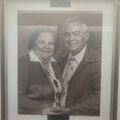OKTÓBER 23.
Érdekes érzés külföldön nemzeti ünnepet ülni, nekem ez már nem az első, Moszkvában és Leicesterben is ünnepeltem március 15-ét, de ez most egészen más volt, "hivatalos" keretek közötti ünnepségen lenni, ahol még feladatunk is volt: János mondta az ünnepi beszédet, én pedig - sokadmagammal - főztem.
A remek szervezésnek köszönhetően minden gördülékenyen ment, az előkészületektől kezdve. Először is, János kiválasztott négy verset,majd sok szenvedéssel megírta a ráadásul angolul elmondandó beszédét (nem akart szégyent hozni a jeles elődökre), mivel a tapasztalatok szerint a vendégsereg jelentős része kevésbé beszél magyarul. A szervezés oroszlánrészét a helyi magyar érdékeltségű diákokból álló kutúrális egyesület végezte. A helyszín az Indiana Memorial Union-ban található egyik terem volt, ahol általában az ilyen reprezentatívabb eseményeket szokták tartani.
Az összeállított műsor nem lehetett hosszabb 25 percnél, így feszes volt. Először a kiválasztott verseket olvasták fel az itt magyarul tanuló diákok, méghozzá gyönyörűen. A verseket projektoron is vetítették, néhánynak az angol fordítását is.Furcsa és egyben megható volt, hogy amerikaiak - igaz akcentussal - de nagy átéléssel és lelkesedéssel mondták el a költeményeket. Különösen a Petri vesekre voltak nagyon büszkék, a magyarok körében Faludy verse váltotta ki a legnagyobb hatást, különösen azért, mert ő is innen párszáz kilométerre, emigrációban (Torontóban) írta meg a 30. évfordulóra.
A versek közé volt beillesztve János beszéde, ami például hozzám egészen közel hozta most ezt az ünnepet. Azzal, hogy személyes élményeit mesélte el a kommunizmus éveivel kapcsolatban, plasztikussá tette a rendszerben nem éltek számára is annak abszurditását. Az ünnep hivatalos részét két magyar dal, és a himnusz közös eléneklése zárta le.
Az eseményre, amely helyhiány miatt valójában október 21-én került sor, 80 vendéget vártak, de ne legyünk naivak, fele legalább azért jött, mert meg akarták kóstolni a házikosztot, aminek itt nagy becsülete van, bármilyen nép is főzze azt. Mi is hivatalosak voltunk a törökök nemzeti ünnepére, ahol a koreográfia hasonló volt, és kíváncsiak is lettünk volna a török ételekre, de sajnos pont Halloween estéjére esett, így ki kellett hagynunk. Az ételek kiválasztásánál szempont volt, hogy az egzotikum határain belül maradjunk, így a túrós csusza fennakadt a rostán, a helyiek el nem tudják képzelni, hogy azt hogyan lehet megenni. Lehet, hogy a pacalpörkölt is így járt volna, de azt mi nem voltunk hajlandóak főzni. Így maradtak a nagy klasszikusok: sült hús, gombapörkölt, tokány, töltött káposzta, marhapörkölt, rakott krumpli és téliszalámi azoknak, akik csak egy szendvicsre vágytak. Mivel ez egy nemzetközi kisváros, ezért szerencsére van orosz bolt, onnak hozták például a palacsintát. (ott lehet kapni rendes túrót is) Nekem a székelykáposzta jutott és még rétest (hamis rétest) sütöttem mellé, de ez utóbbit nem vállaltam el hivatalosan, hátha nem sikerül, Székelykáposztát sem főztem még soha, és Jánoshoz hasonlóan engem is nyomasztottak a nagy elődök. Ráadásul Vecsés messzessége miatt itt csak jó német savanyú káposztát kapni (az őslakosság itt a pár indiántól eltekintve legalább 5-600 kilométeres sugarú körben alapvetően német). Elolvastam az idevágó szakirodalmat, kiszótáraztam egy szimpatikus receptet, aztán irány a bolt. Végül is minden volt, kivéve a meggyet a rétesbe, amit szintén csak az orosz boltban lehet beszerezni, helyette cseresznyét kaptam. Négy kiló káposztából, és kb. 3 kiló húsból álltam neki a főzésnek. Végül a legnagyobb nehézséget az jelentette, hogy nem volt normális méretű lábosom, így csöbörből vödörbe öntögettem mindent. Aztán minden egy szempillantás alatt elfogyott.
A gyerekeknek nagyon tetszett a magyar társaság, végre nem érezték magukat elveszettnek, így sokat játszottak és rohangáltak körbe-körbe, el is határoztuk, hogy tekintettel a nagy létszámú magyar gyerekseregre, Mikulást is megüljük. Önként jelentkező Mikulást már kijelöltük: egy erdélyi magyar származású, de románt oktató fiú személyében. Krampuszaink még nincsenek, várjuk a jelentkezőket!
Végezetül egy kis jegyzőkönyv az utókornak. Az alábbi versek hangzottak el:
- Petri György: Leonyid Iljics Brezsnyev emlékére
- Faludy György: 1956, te csillag
Az alábbi énekek zárták az ünnepséget:
- Szól a kakas már
- Túl a vízen
És az alábbiakban János mondta beszéd szerkesztett vázlata:
Speech on celebrating the uprising and revolution of 1956
Edited draft
October 21th, 2014, Bloomington, Indiana, IMU
János B. Kocsis
György Ránki Hungarian Chair
Several years ago I realised that my students didn’t understand when I gave them lecture on socialist urbanisation, socialist policies and decision-making techniques, on building and living in housing estates that mark the skyline of many of Hungarian cities even today and were a dream come true for many families some forty years ago. First I thought it’s very sad that they didn’t know and they didn’t even care about that then I understood they were actually lucky, not to have vivid memories about that part of the Hungarian, and Eastern European, history.
What was ‘existing’ socialism like? It was, of course, different to everybody, different in towns or villages, or in Budapest, and people of different position had different perception. Nowadays many tend to say that people generally liked the reign of Kádár but it’s far from that. For me, and I think for many, the figure of the party secretary represents best the system: a contra-selected, arrogant, obtuse, blunt, inept and aggressive local party appointee who has a final say in basically everything; but also the system in itself was absurd in many ways. When I was very young I remember once throwing snowballs at a traffic sign with friends on our way home from school when the local policeman, worthy counterpart of local party secretaries, grabbed and took us to his office accusing us of deliberately damaging properties of the hard working people. I remember a pioneer summer camp with long hours of communist ideological sessions in the summer heat at the age of ten when we just wanted to get out and have fun. I remember most of my classmates dreaming of an adult life in the ‘free west’ that we, living in the western part of the country and watching Austrian television on a daily basis had some view about. I remember a schoolmate shouting at me happily in 1982 on the way to school saying ‘The old fart kicked the bucket’ and we all knew whom he meant by that. I remember the ‘click’ sound when I picked up the telephone receiver in the Benedictine Secondary School in around 1986-87, just a couple of years before the collapse of the system. And just on the early dawn of 15th of March, 1989, my classmates got out from the dormitory in Győr to collect the red flags from beside the Hungarian tricolors and I remember the arrival of the secrete and normal police right in the morning to collect them where they spent the day in fear while Imre Pozsgay spoke of a free country where the remembrance and the memory of the heroes of 1956 would live on. Others have different recollections and different feelings but I think we all agree that we wish the fight of the men and women of 1956 had been successful.
But could it have been successful? All historians and diplomats familiar with that time agree that no, it could not have been. Then the people of Hungary felt an opportunity after Austria was released from the iron grip of the Soviet Union just a year earlier and Khrushchev’s speech on the famous 20th Soviet Communist Party Congress the same year that sounded hopeful, and even possible. These people after a lost war grabbed the moment to fight for their freedom and for some days it seemed they could succeed. Then the realities intervened: the Western powers were more occupied with their own conflicts about Suez Canal then interceding in a country beyond the Yalta boundaries and the Soviets soon regained their harsh stance. As to the consequences, in the revolt, several thousands were killed by the Soviets and their Hungarian collaborators, hundreds of thousands had to leave the country, ‘draining’, as someone wrote, ‘Hungary of its intelligentsia for generations to come’. As Henry Kissinger, one of those who know most about diplomacy and recent European history clearly states it couldn’t have succeeded and it signed the beginning of a harsh period of the Cold War. But as the first major anti-Soviet uprising in Eastern Europe it played a primary role in the collapse of communism some decades later that first uncovered the lies and true absurdities of the system, for wider Western, audiences, too.
On this day let us remember those who revolted, fought against this cruel régime, died or were imprisoned, mortified or forced to leave the country, for their deeds will live on.

.jpg)
.jpg)
.jpg)
.jpg)
.jpg)
.jpg)




